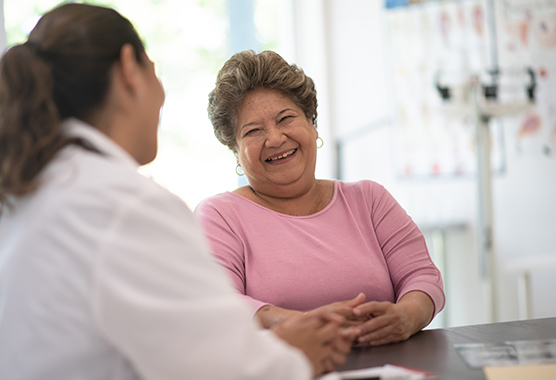Thyroid Disorders
At UC Davis Health, we offer the highest level of care for all types of thyroid disorders. We provide diagnosis, treatment and support options personalized just for you.
Medically reviewed by Jose Joaquin Lado Abeal, M.D. on Oct. 14, 2024.

What Are Thyroid Disorders?
Your thyroid is a small gland in the front of your neck. It makes hormones that control how your body functions (metabolism). Thyroid disorders occur when:
- Your thyroid makes too few hormones (hypothyroidism).
- Your thyroid makes too many hormones (hyperthyroidism).
- You have a non-cancerous or cancerous thyroid growth (nodule) or enlargement (goiter).
At UC Davis Health Division of Endocrinology, our experienced hormone doctors (endocrinologists) specialize in diagnosing and treating thyroid diseases. No matter your thyroid condition, we provide comprehensive and compassionate care.
Symptoms of Thyroid Disorders
Symptoms vary based on whether you have hypothyroidism or hyperthyroidism. Goiters, nodules and thyroid cancer have varied symptoms depending on size and stage.
Common Symptoms of Hypothyroidism
- Dry hair and skin
- Fatigue
- Heavy and frequent menstruation
- Hoarse voice
- Memory problems
- Sensitivity to cold temperatures
- Weight gain
Common Symptoms of Hyperthyroidism
- Anxiety, irritability and nervousness
- Difficulty sleeping
- Irregular or no menstruation
- Muscle weakness
- Vision problems
- Sensitivity to heat
- Weight loss
Causes of Thyroid Disorders
Many factors may lead to thyroid disorders. Causes may include:
Autoimmune Conditions
Some autoimmune diseases, such as Graves’ disease, may lead to hyperthyroidism, while others, such as Hashimoto’s thyroiditis, can cause hypothyroidism.
Congenital Defect
Some babies’ thyroid glands may not develop properly from birth, leading to hypothyroidism.
Deficient or Excess Iodine
Not having enough iodine to help your thyroid make hormones may lead to hypothyroidism, while having too much iodine may cause hyperthyroidism.
Nodules
Overactive growths (nodules) inside your thyroid may make excess thyroid hormones and lead to hyperthyroidism.
Pituitary Gland Dysfunctions or Cancerous Growths
Rare pituitary gland conditions or cancerous growths can disrupt your hormonal balance and lead to hyperthyroidism.
Pregnancy and Childbirth
Being pregnant and having a child can temporarily cause hypothyroidism.
Radiation Therapy or Surgery
Radiation therapy or endocrine surgery to remove your thyroid (thyroidectomy) to treat head and neck cancers can lead to hypothyroidism.
Thyroiditis
Thyroid gland inflammation (thyroiditis) can cause your thyroid to leak excess hormones, which may lead to hyperthyroidism.
Thyroid Disorders Risk Factors
Anyone can develop a thyroid disorder. But the chances are higher if you also have one or more of these risk factors:
Age
People older than age 60 have a higher chance of a thyroid disorder.
Family History
A family history of thyroid disorders increases your risk.
Sex
Women are at higher risk for hyperthyroidism, and women over 60 have an increased risk for hypothyroidism.
Medical Conditions
Certain medical conditions, such as celiac disease, lupus and type 1 diabetes, increase thyroid autoimmune disorder risk.
Medications
Some medications high in iodine or lithium may raise thyroid disorder risk.
Diagnosing Thyroid Disorders
We can do blood tests to diagnose a thyroid disorder. We may also suggest imaging tests, such as a thyroid scan or an ultrasound, to look for nodules as well as any changes in your thyroid’s size and shape.
We may also do a physical exam to feel your thyroid for any growths. If you do have a nodule, we may recommend fine needle aspiration (FNA) and a biopsy to take a sample of cells from your thyroid and test it for cancer.
Thyroid Disorders Treatments at UC Davis Health
At UC Davis Health, our endocrinologists specialize in treating thyroid conditions. We will work with you to come up with a treatment plan that best meets your specific situation. Treatments that we offer include:
Medication
Thyroid replacement medications can treat hypothyroidism, while anti-thyroid drugs can treat hyperthyroidism.
Radioactive Iodine Therapy
Radioactive iodine treatment (nuclear medicine) damages your thyroid’s cells, which stops it from producing too many thyroid hormones.
Surgery
Removing part or all of your thyroid (thyroidectomy) prevents it from making excessive thyroid hormones. It also removes cancerous cells and nodules or goiters that cause symptoms. You’ll need to take thyroid replacement medications after this procedure.
Hypothyroidism affects about
5 in 100 Americans ages 12 and older
Hyperthyroidism affects about
1 in 100 Americans ages 12 and older
Source: National Institute of Diabetes and Digestive and Kidney Diseases (NIDDK): and Hyperthyroidism
Request an Appointment
As Sacramento's No. 1 hospital, you'll benefit from unique advantages in primary care and specialty care. This includes prevention, diagnosis and treatment options from experts in 150 specialties.
Referring Physicians
To refer a patient, submit an electronic referral form or call.
800-4-UCDAVIS
Patients
Call to make an appointment.
Consumer Resource Center
800-2-UCDAVIS

Ranked among the nation’s best hospitals
A U.S. News & World Report best hospital in cardiology, heart & vascular surgery, diabetes & endocrinology, ENT, geriatrics, neurology & neurosurgery, and pulmonology & lung surgery.

Ranked among the nation’s best children’s hospitals
U.S. News & World Report ranked UC Davis Children’s Hospital among the best in pediatric nephrology, orthopedics*, and pulmonology & lung surgery. (*Together with Shriners Children’s Northern California)

Ranked Sacramento’s #1 hospital
Ranked Sacramento’s #1 hospital by U.S. News, and high-performing in aortic valve surgery, back surgery (spinal fusion), COPD, colon cancer surgery, diabetes, gynecological cancer surgery, heart arrhythmia, heart failure, kidney failure, leukemia, lymphoma & myeloma, lung cancer surgery, pacemaker implantation, pneumonia, prostate cancer surgery, stroke, TAVR, cancer, orthopedics, gastroenterology & GI surgery, and urology.

The nation’s highest nursing honor
UC Davis Medical Center has received Magnet® recognition, the nation’s highest honor for nursing excellence.

World-class cancer care
One of ~59 U.S. cancer centers designated “comprehensive” by the National Cancer Institute.

A leader in health care equality
For the 13th consecutive year, UC Davis Medical Center has been recognized as an LGBTQ+ Healthcare Equality Leader by the educational arm of America’s largest civil rights organization.

